


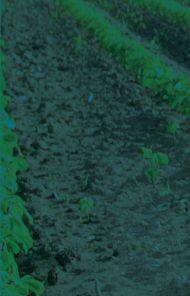










Bayer is honoured to support Influential Women in Canadian Agriculture.
We believe in recognizing and promoting women's contributions across every facet of Canadian agriculture to help shape a more vital, creative and inclusive future we're all proud to be a part of. We're committed to pushing our industry forward by embracing women's unique perspectives, their invaluable contributions to the industry, and continuing to farm for change.
Influential Women in Canadian Agriculture (IWCA) is a recognition program designed to honour, highlight and celebrate the work women are doing across Canada’s agriculture industry.
Now in its fifth year, IWCA is proud to present the seven women chosen as the 2024 Influential Women in Canadian Agriculture.
Please join us in congratulating: Kendra Donnelly, president, Ki-Era Cattle and Consulting; Cheryle Warkentine, co-owner, Aletta Holsteins; Sabine Banniza, professor, Crop Development Centre, University of Saskatchewan; Mel Luymes, executive director, LICO; Liz Robertson, executive director, CAFA; Chris Brown, acting director, agriculture development branch, OMAFRA; and Kimberley Cathline, HESIC associate director, Niagara College.
These leaders have already shared their stories, wisdom and insights in the IWCA podcast series on AgAnnex Talks, a podcast channel presented by Top Crop Manager, Potatoes in Canada, Canadian Poultry, Fruit & Vegetable, Drainage Contractor and Manure Manager magazines.
Now, we’ve included highlights from those inspiring conversations in this digital publication.
What’s more, this year’s IWCA program will once again culminate with a virtual event in the fall that brings together women from across agriculture to share in their experiences, offer guidance and advice in an interactive setting.
The fifth annual IWCA Summit will take place on October 22. It will feature panel discussions on topics like overcoming challenges and advocacy as well as an inspiring keynote from Nettie Wiebe. Register today for this virtual mentorship event with some of the most influential leaders in Canadian agriculture at agwomen.ca.
The team behind IWCA wishes to extend a sincere thank you to our audiences for participating in the program and to our sponsors for their support. Enjoy these leaders’ inspiring stories in the pages ahead!
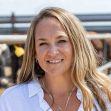
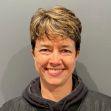

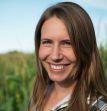


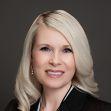
18 16 14 6 4 9
Kendra Donnelly Back to Business with Agriculture
Cheryle Warkentine A Way of Life
Sabine Banniza
Excellence is the Root of Confidence
12
Mel Luymes The Facilitator
Liz Robertson Transforming Farm Advice
Christine Brown The Steward
Kimberley Cathline Forging Ahead
IWCA Honouree: Kendra Donnelly
To listen to our podcast interview with Kendra, visit agwomen.ca

Kendra Donnelly finds her way back to farming through agribusiness.
By Kaitlin Berger
While growing up on a feedlot operation propels some farm kids to launch into a career in agriculture, that wasn’t the case for Kendra Donnelly. She didn’t enjoy working with animals and didn’t initially see another path into an agriculture career. It was pursuing a business degree – and the opportunities and people she met along the way – that changed her perspective on a one-size-fits-all approach to adding value to the farm.
“It doesn’t come natural to me to work with the animals,” says Donnelly. “I get nervous, or I just don’t have that talent like a lot of my friends do, so I never really initially thought it was a fit for me.”
Starting out to complete a business degree, Donnelly received the opportunity for an internship at a veterinary consulting company. She worked there for ten years while she completed a bachelor’s, a master’s degree in business administration, and a CPA accounting designation.
“I got to see a perspective from a whole different business, a consulting business in the feedlot industry, and had some amazing mentors through that time,” she says.
It was this experience that opened the door for Donnelly and her husband to partner with her parents as shareholders in a feedlot operation near Acme, Alta. in 2015. “My experience within a different way to bring value to agriculture and agribusiness allowed me to see where I fit,” she says. “Rather than, you know, riding a horse and herding cattle, which wasn’t my natural place I could fit within the farm, I now saw a different way that I could add value.”
This initial investment with her parents grew into multiple businesses. Based in Alberta, Donnelly is now the president of Ki-Era Cattle and Consulting, a company that provides business development, administration and CFO services within the beef industry.
With her education and experience, she leads a team of people with expertise in finance and accounting, human resources and business development and sustainability. “Accounting and human resources and finance, no matter what business you look at needs those skills,” she
says. “It doesn’t need to be agriculture. I just get agriculture. I understand the needs within agriculture that I was able to probably add more value quicker.”
Donnelly says she’d call herself a farmer, rancher and cattle feeder, but she never sits in a combine and isn’t usually picked first to help with processing cattle. “I just bring a whole different skillset, and I think I was maybe insecure early on in my career on that, but now I’ve just realized it’s a team approach,” she says. Agribusiness requires many skillsets.
“There will be tough feedback at times, but don’t read into that too much. Just keep pushing forward.”
Now that Donnelly has three kids, she says she doesn’t have as much time for self-doubt. “I have to be there for my kids,” she says. “I can’t work 24/7, so I have to be extremely productive in the time that I have.”
As someone who has high expectations for herself and her team members, Donnelly reminds herself that she is usually her own biggest critic. “You need to not push that self-doubt away and go for it and be confident in it, and you’ll get the feedback, and there will be tough feedback at times, but don’t read into that too much,” she says. “Just keep pushing forward.” Donnelly argues that self-doubt can be healthy. It can be motivation to help people question their decisions, consider other perspectives, evolve, improve and innovate.
Pursuing innovation
One major innovation that Donnelly is excited about is her project with Tidewater Renewables to create an industry-leading, onsite bio-digestor technology. “The overarching concept there is that we upgrade or add more value to our manure, and we manage our manure more effectively for odor reduction, dust reduction and just working

with the manure quicker reverses our limiting ability right now,” says Donnelly.
Usually, manure management happens two times a year, when the crops are harvested in the fall or in the spring before seeding. “The biggest part is the cattle performance that really made us start to think about how can we better utilize our manure,” says Donnelly, “because in Alberta, especially in our northern feedlot sites, we have these mud events, because there’s a buildup of manure, and the clay lined pen gets mixed in with the manure and creates mud.”
The goal is to upgrade manure into four products. They water recycle by ensuring the water in the manure is incorporated into the system, the nutrients are captured and used more effectively in precision agriculture and the fibre within the manure is used for other purposes such as cattle bedding or peat for greenhouses. The foundational goal is methane capture, however. “The one that has really allowed us to kick it off and make it economically viable is the methane capture,” says Donnelly. “So capture the biomethane and upgrade it to renewable natural gas and inject it into our pipeline network that’s all across Alberta to be utilized in the one project would be utilized in [3,000] to 5,000 homes.”
Having an economically viable solution to remove manure from the pen more frequently and reduce odor and dust not only benefits farmers, but also the surrounding communities. “We live in the communities too,” says Donnelly, “so we want to see the beef industry evolve and benefit everyone.”
It takes strong leadership and a strong team to develop these innovative projects and ideas. “I really, really appreciate that team, especially as I age and I get into a more important role for the family business and the businesses that I work for is that it’s not all on me,” says Donnelly. She appreciates the chance to brainstorm, get feedback and think through various options with others before making the final decision.
As Donnelly’s career has progressed, her respect for other perspectives has grown. She often leans on her parents and their peers for advice and values the wisdom of her grandparents’ generation. “We all have to go through our own journey, but don’t be naïve to the wisdom that the previous generation brings,” she says.
Agriculture is stronger with diversity, whether that’s leaning on the perspectives of older generations or bringing in people who don’t have an agricultural background. Donnelly never saw herself developing an energy company with manure, but projects like the bio-digestor technology require multiple partnerships and team members with unique expertise. “I’m really trying to think broader on how we can be sustainable within agriculture and agri-food and specifically within the beef industry,” says Donnelly.
Understanding other people’s perspectives is what gives Donnelly insight into operating a business and developing projects that are socially responsible and sustainable. “I’ll fall short sometimes but I need to not just wear the CFO hat,” she says, “I need to be sustainably, environmentally and socially responsible when I make decisions.” •
IWCA Honouree: Cheryle Warkentine
To listen to our podcast interview with Cheryle, visit agwomen.ca
Livestock producer Cheryle Warkentine feels a deep connection to her animals, the land and her community.
By Brett Ruffell
For Cheryle Warkentine, livestock farming is more than a profession – it’s a way of life. Her bond with animals has been central to her experience from a young age. “When I was young, I struggled with anxiety,” says Warkentine, who helps run a mixed operation that includes dairy cattle, laying hens, hogs and crops.
This challenge was mitigated through her connection with animals, particularly cows, which she found incredibly therapeutic. Being with the animals provided her with peace and a renewed sense of direction, she explains. This strong connection is evident in her work, as she considers it a privilege to care for her animals.
Warkentine’s agricultural roots run deep, with a family dairy farm that has been in operation for generations. Her father, ahead of his time in their Mennonite culture, included her as a full partner when she was just 20, despite it being rare for daughters to have such opportunities. “I was lucky,” she says.
Her role on the farm evolved from hands-on tasks such as milking cows and fieldwork to managing bookkeeping and financial responsibilities. This shift allowed her to utilize her organizational skills and balance the growing demands of both the farm and her family.
Managing multiple species on the farm introduces distinct biosecurity challenges.
Warkentine explains the rigorous measures in place: “Especially with some of the worries of avian flu coming into the dairy sector, the biosecurity has always been tight.”
The poultry sector benefits from high biosecurity standards, with strict protocols for managing cleanliness and feed storage. However, integrating dairy cattle adds complexity due to the open nature of dairy barns and frequent movement of equipment and personnel.
“Dairy has a lot of community sheds, which are open to birds and things,” she notes. Despite these challenges, Warkentine remains proactive in adapting her biosecurity measures to safeguard both her poultry and dairy cattle.
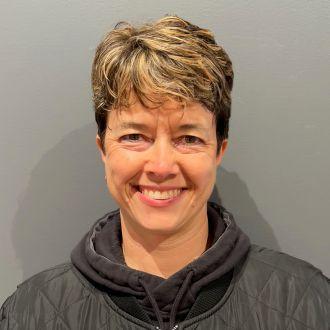
Warkentine has faced significant adversity, including a severe farm accident involving her young son. At just three and a half years old, her son was critically injured, leading to a harrowing five-week stay in the children’s PICU at Children’s Hospital in Winnipeg.
“There’s something special about working with animals. It’s a privilege to care for them, to see them thrive under your care.”
During this period, Warkentine was also managing the birth of her fifth child and caring for a two-year-old at home. She recalls the intense emotional strain: “I dealt with a lot of guilt with what happened and going forward I still had five precious children that I was trying to raise on a farm and keep safe.”
Despite these overwhelming challenges, Warkentine and her family persevered. While her husband managed the farm and supported their son at the hospital, Warkentine handled essential farm tasks and administrative duties.
“My husband would farm all day, and then he’d come sit beside his bed at night, and I had to do payroll on the hospital and different things like that,” she explains. Her son made a remarkable recovery and is now a healthy, happy individual and a talented hockey player. “It’s exciting to see how that all worked out,” she says with pride.
Giving back
Warkentine’s commitment extends beyond her farm to her community and the agricultural industry. She and her husband prioritized involving their children in community activities. “When my husband and I started having kids, it was very important to us that our kids would be involved in our community, and people
Corteva Agriscience is proud to support Influential Women in Canadian Agriculture.
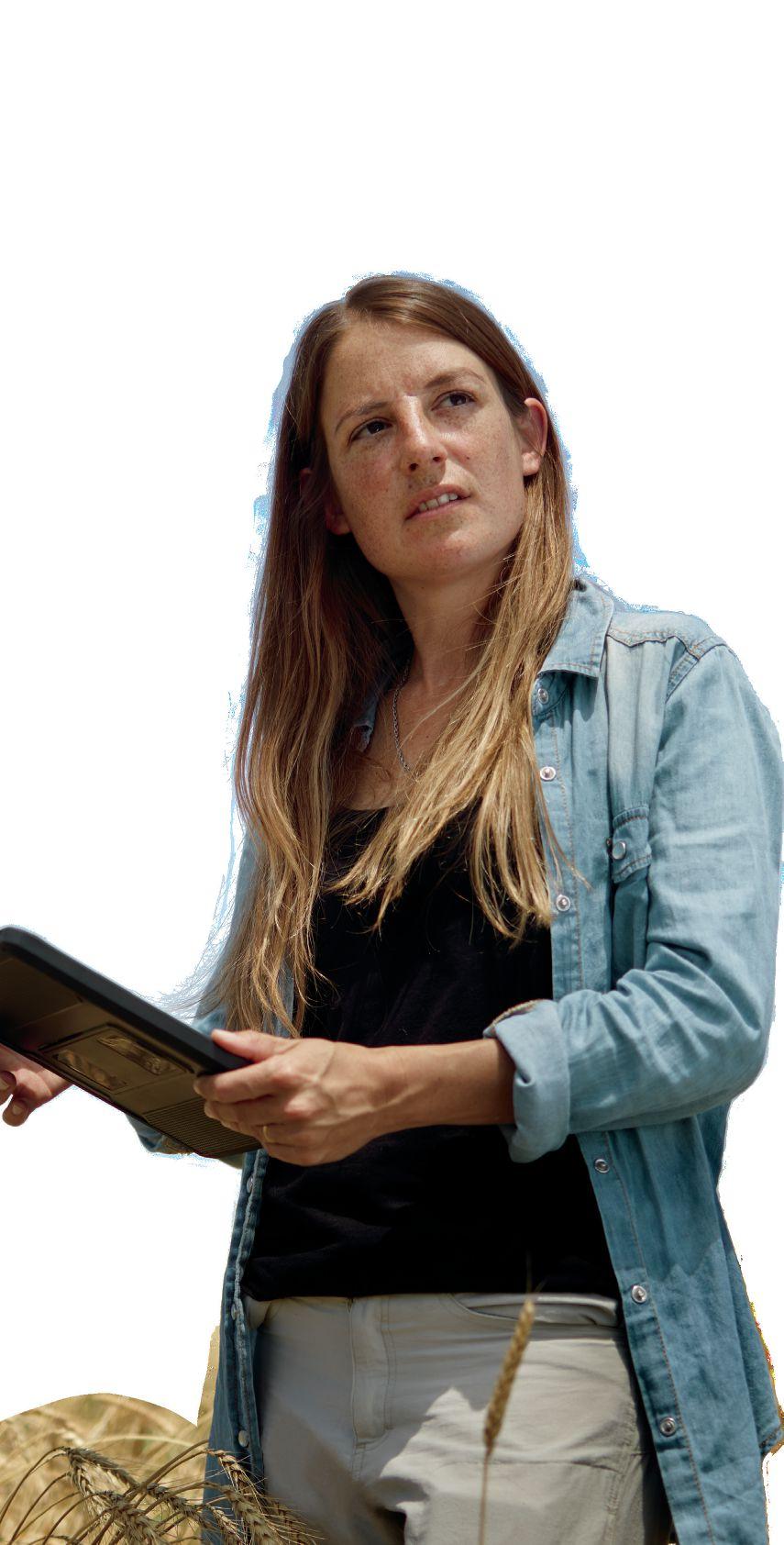
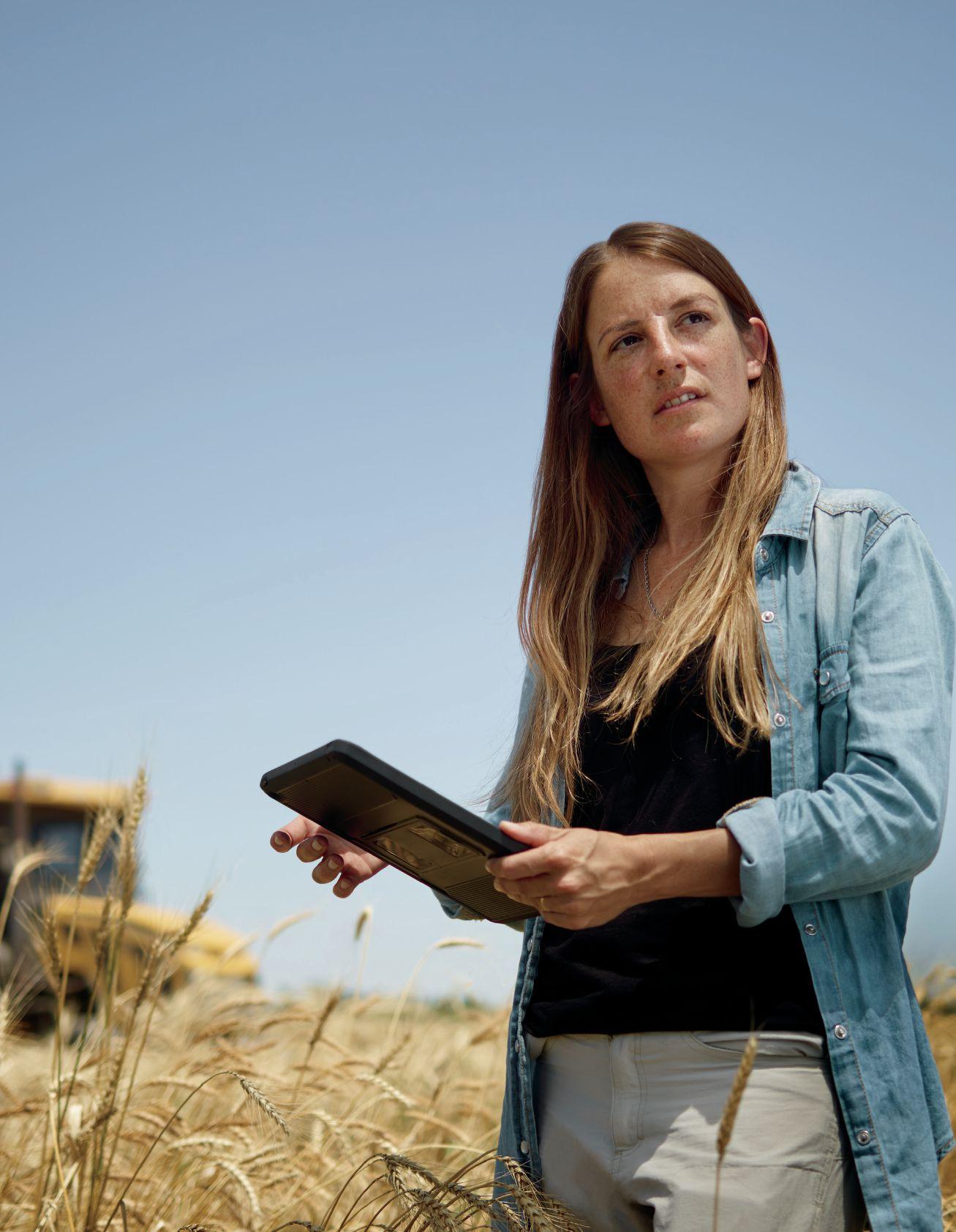
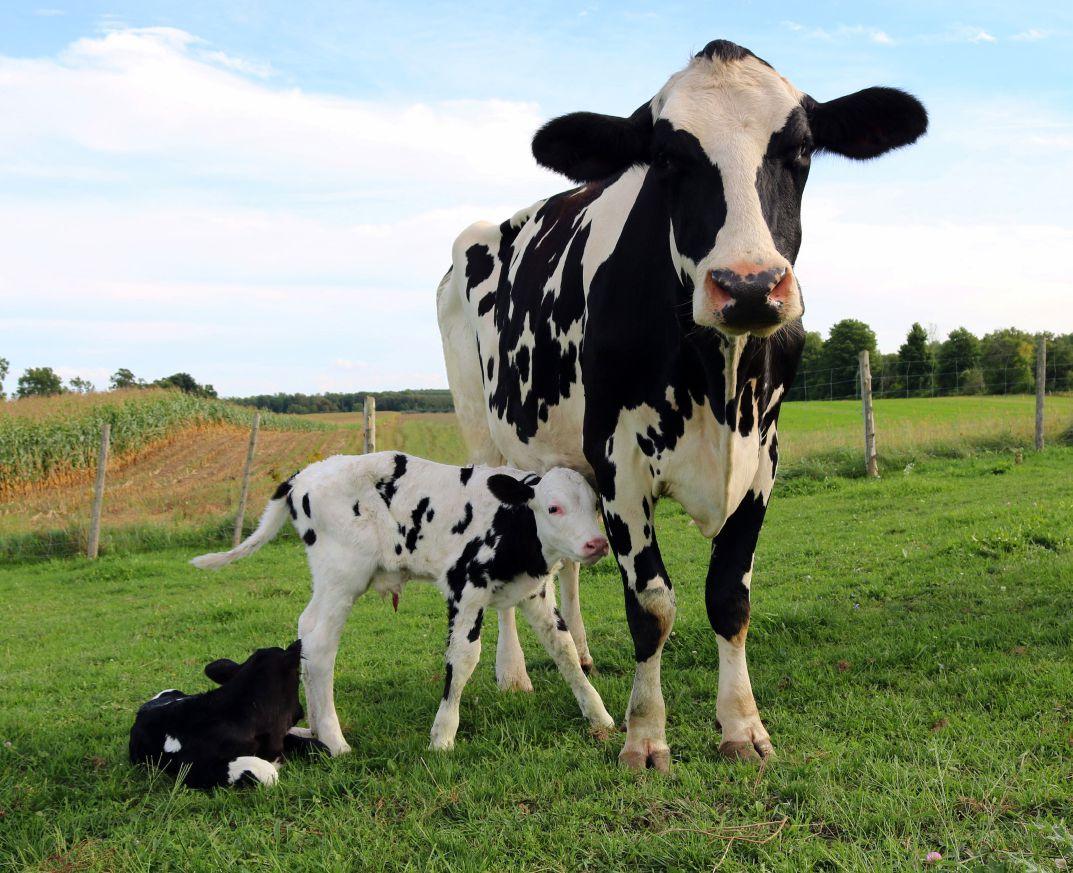
will get to know us as people,” she explains. This vision led to her involvement in managing sports teams and organizing local events.
Her children’s participation in sports like hockey, baseball and volleyball provided opportunities for Warkentine to engage with the community beyond agriculture. “To be involved there with people who weren’t necessarily in the agriculture industry, and they get to know you, and you could show that you cared about your community,” she says.
She also helped organize volleyball camps and hockey camps, with the latter serving as fundraisers for the minor hockey board. “We also run some hockey camps in summer, and that was all as a fundraiser for our minor hockey board,” she shares. Her collaborative efforts with friends and local organizations underscore her dedication to fostering a positive image of agriculture and building community ties.
Warkentine’s vision for the future includes a stronger connection
between farms and their communities. “My dream would be that we would have a stronger connection between farms and communities,” she shares. She believes improving public understanding of agriculture is crucial, especially in light of misinformation on social media. “I think there’s a lot of misinformation on social media, and a lot of different movements that are giving people bad impressions,” she notes.
Warkentine is passionate about sustainable farming practices, emphasizing their benefits to both the environment and the farm itself. “We believe so much in what we’re doing...embracing the sustainable farm practices benefit us more than anybody else,” she says. She highlights the extensive efforts involved in modern farming, including soil rejuvenation and careful livestock management.
Despite the challenges posed by misinformation, she hopes increased transparency will help restore trust and demonstrate the genuine commitment of farmers to their work. “I would like people to get to know me, get to see what we’re doing, and see that we’re trying to do things as good as we can.” •
IWCA Honouree: Sabine Banniza
To listen to our podcast interview with Sabine, visit agwomen.ca
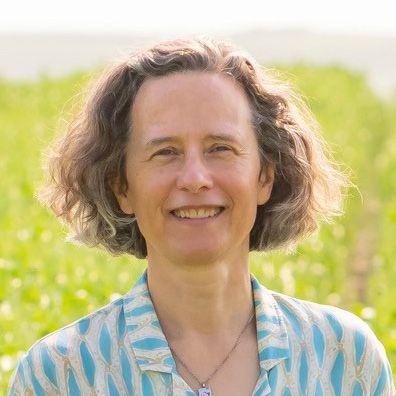
Sabine Banniza develops good practices that have contributed to many years of excellent research.
By Kaitlin Berger
Sabine Banniza, professor at the Crop Development Centre (CDC) at the University of Saskatchewan and strategic research chair in pulse crop pathology, encourages young people to strive for excellence in their work. That ambition has driven her own career success – and led to her being nominated as one of the 2024 Influential Women in Canadian Agriculture.
“Throughout my career, I’ve always been striving for being really good at what I do,” she says. “And maybe there is sort of a streak of perfectionism as well, but I think that is really important to be really good at what you do, because that, in turn, gives you confidence.” With this foundation of excellence, Banniza has dedicated over twenty years to specializing in research on diseases in pulse crops, as well as leading research teams and providing training through the Crop Diagnostic School.
Banniza’s ambition for agriculture began when she was a child, growing up in Germany. “I was a child that always liked to get the hands dirty, so from early childhood on, I was always digging around and taking pits of oranges and dates and growing them,” she says. When she was coming of age, she remembers hearing about big famines in Africa. “I think that made me so much more aware how important food is, that we all need food, and so I think that certainly has become sort of a driving force for me to pursue a career in agriculture.”
Over time, Banniza became interested in pests and diseases, partly through the influence of two professors who demonstrated a comprehensive knowledge that motivated Banniza to want to expand her learning. “The person who was probably most pivotal for me to become a plant pathologist was a professor during my master’s degree,” she says. “He just exuded so much enthusiasm and had so much knowledge, and that was just so inspiring.”
Diving into her career as a plant pathologist, Banniza was in the minority as a woman. “You don’t really think about it, because you don’t see anything else,” she says. It was simply the norm. “At my undergraduate universities, I think there were two female professors. When I did my master’s degree, we weren’t taught by a single female professor. Again, with my PhD, women were in the minority,” she explains.
Growing up with two sisters, Banniza was raised with the idea that gender is not a barrier to doing what you want to do. “The world is your oyster, and you can do whatever you set your mind to, and that’s sort of how I approached my career,” she says. While there were points in her career where she faced roadblocks, she says she didn’t have the awareness that some of those challenges might have been gender-based. “If I had had that awareness, maybe I would have realized that sometimes it wasn’t me, it was just the fact that I was a woman.”
“I think that is really important to be really good at what you do, because that, in turn, gives you confidence.”
As the first female professor at the CDC, Banniza has seen more women moving into leadership positions throughout her career. “I think it’s good that more women are moving into these positions, because it certainly does change the dynamics in the workplace, and I think for the better.” She says young women are more aware of gender bias and have the confidence to call it out.
Striving for excellence is an important aspect of developing that confidence. “Having this confidence in your knowledge and the quality of your research is really important to then sort of judge, is this fair or isn’t that fair,” says Banniza, “and then even if it isn’t fair, to sort of argue your case.”
The right support system can also provide valuable insight during difficult situations. “It’s also very important to have mentors in the workplace, whom you can ask and where you are confident that you get an honest response,” says Banniza who’s benefited from mentorship in her own career.
Paying it forward
Now she’s focused on paying it forward. “It’s sort of part of that unwritten generational contract,” she says. “I benefited from other people men-
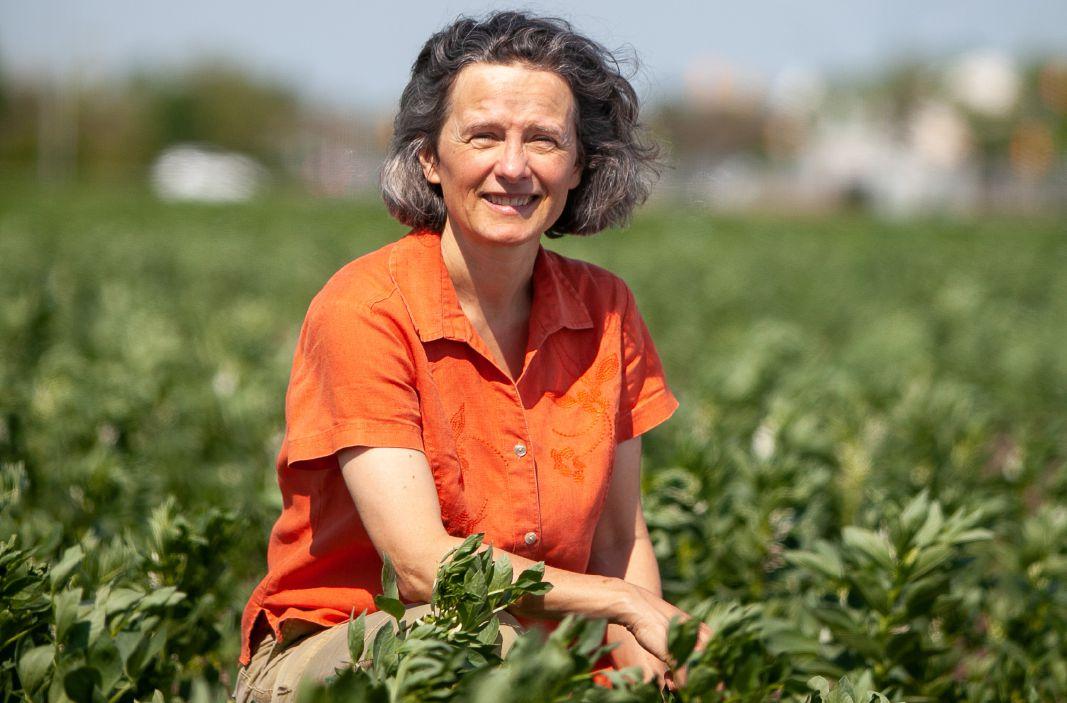
toring me, passing on their knowledge and experience, and so I feel I have to do the same.”
Investing in younger people not only gives her joy, but she also says she learns from their perspective too. “Often people who haven’t worked in a field, or as long as I have, obviously look at things with fresh eyes, and so sometimes they come up with really interesting ideas and views that I hadn’t thought about.” It gives her personal joy to see their enthusiasm and watch the direction of their careers.
Mentorship is only one leadership role she’s held. She’s also led research teams and watched her research programs grow and expand over the years. “As your research group grows and your program grows, you have to delegate more and more,” she says. She’s realized that she can transfer responsibilities to her team without any negative consequences. “I have a really excellent research group who manages without me always being there and that is so important.”
To have that confidence in her team, she’s recognized the importance of hiring the right people, establishing good communication – and letting go. This not only gives her more time to focus on other work, but it also provides her team with a more rewarding experience. “They feel more fulfilled in their position as well, and if people are happy at the workplace, they perform better,” she says, “so it then benefits you as well.”
One of the biggest curveballs Banniza has faced in her career is the result of having such a strong, closeknit research team. One international stu-
dent who started on her team was diagnosed with brain cancer and eventually passed away. “That was probably the lowest point in my career,” she says. “For technical issues, you eventually will come up with solutions, workarounds, but these personal events that’s [...] where you often feel very helpless and don’t really know how to deal with them.”
Even with a busy career, it’s situations like these that reinforce how necessary it is to pursue mental wellness. Banniza prioritizes working out first thing in the morning and pursuing other activities that bring her joy. “In the summer, I really enjoy gardening. And in the winter, I enjoy snowshoeing a lot, and just sort of in general, I also really enjoy going for long walks,” the scientist says.
These good practices provide a strong foundation for excellent research. Banniza says she’s particularly proud of a project she started when she became a professor at the CDC. “When plant breeders study the genetics of a trait, they have to develop populations, so they pollinate a plant and then grow the seeds,” she explains. “And we have [...] succeeded in doing something similar with a fungal pathogen, and that is pretty unique.” While it hasn’t been the main part of her research, they’re still benefiting from the knowledge it’s providing on the pathogen and resistance in the host plant.
There are great opportunities out there, says Banniza. While she’s faced barriers and challenges throughout her career, it hasn’t stopped her from pursuing learning and taking risks. “The world is your oyster,” she proclaims, “so just go out there and find your way.” •
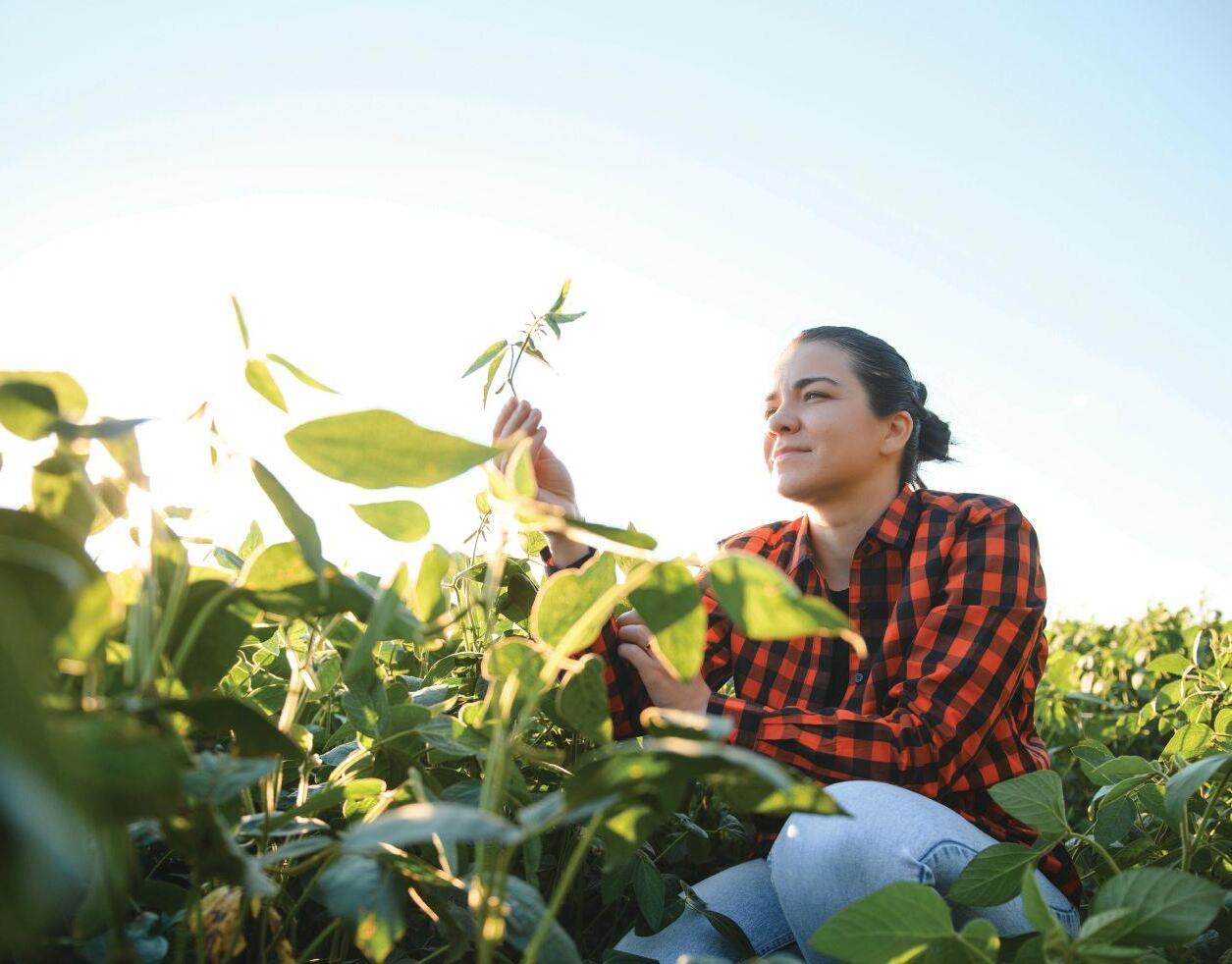
Register for the 5th annual Influential Women in Canadian Agriculture Summit
Join us online, from anywhere, to hear from today’s most influential female leaders in Canadian agriculture.
This year, the seven IWCA honourees of 2024 will come together with other prominent trailblazers to share their experiences, lessons learned, advice and more during the virtual IWCA Summit. Join us for an afternoon of interactive conversation as they share their knowledge, offer guidance and discuss their journeys in agriculture.




IWCA Honouree: Mel Luymes
To listen to our podcast interview with Mel, visit agwomen.ca
For LICO’s executive director Mel Luymes, putting herself out there pays off in every way.
By Bree Rody
Melisa Luymes is better known as “Mel” to friends. And if you work in Ontario agriculture, odds are you’re her friend.
Luymes holds several titles – “I guess I work as a freelancer,” she says – including executive of the Ontario Professional Agri-Contractors Association (OPACA), executive director of the Land Improvement Contractors of Ontario (LICO) as well as a freelance writer covering rural issues. This means her career takes her to a variety of settings, among a variety of crowds, conversing about a wide variety of topics. “I never really liked doing one job anyway. [I like] anything that improves agriculture, whether that be the economics, or, honestly, I care most about the environment.”
Switching between roles – and, to some degree, personas – is part of Luymes’ DNA.
“Being a leader, you have to work on that personality,” she says, adding that there are times when she consciously adapts to the environment she’s in. “We’re all sort of naturally mimicking the world around us,” she says.
There’s a lot of mental energy involved in that, Luymes says. She acknowledges that she puts her whole heart into it, and that she doesn’t always succeed at balancing. “Putting all that energy and so much heart, especially with the work ethic of a farmer, can lead to burnout.”
But it also pays off. One of her nominators, Chris Hay – Luymes was nominated both by independent agricultural water management consultant Hay and AGREM VP Jeremy Meiners – stated that Luymes’ ability to identify with people from all walks of life has made her a proficient facilitator of conversations that are normally not easy.
“Her work has started and expanded conversations around some of the difficult issues of agriculture, sustainability and the environment,” Hay wrote in his nomination form.
She has an education largely in the humanities, including a Master’s degree in sociology. “Just the other day, I was looking at third-party certification for polyethylene drainage tubing, and wondering, ‘what does a Master’s in sociology and a certificate in conflict mediation have to do with what I’m doing?’” But jokes aside, Luymes sees the connection. “These issues are human,” she says. “It’s drama between people that’s inhibiting progress, governance issues, miscommunication, so I end up using [my education] every day. And ultimately, you learn how to learn in school, so you can apply that anywhere you go.”
Luymes’ ability to facilitate tough conversations and find common ground
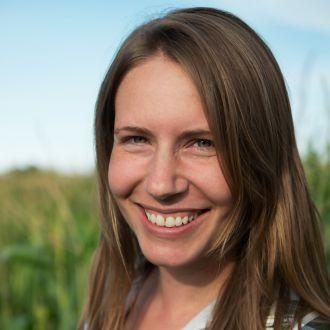
in the shakiest of places is a result of her own journey through life.
Growing up in a family that farmed beef cattle, Luymes’ parents, who also did custom work, instilled a strong work ethic and, in her own words, a “git-er-done” attitude. “It influenced a lot, the fact that my family still farms,” she says. Nevertheless, Luymes always dreamed of leaving the farm, which led her to study and briefly work overseas. But wherever she went, Luymes says, she was drawn to farming and agricultural practices there. After some time, Luymes realized this meant farming was in her blood, and it was time to come home.
But she also came home with something many young students return home with – an idealist, environmental bent. Environmentalism is still very much a part of Luymes’ passions, but by her own admission, her newfound environmental enthusiasm was “perhaps annoyingly, self-righteously so, even.” This led to butting heads for some time, but Luymes credits her family: “That conflict, we stayed with it and developed an understanding, and what came out of it was a really practical environmentalism.”
“For my work, staying rooted in the farm, [I think] all environmentalism has to be grounded in reality.”
For the family farm, that meant Luymes was able to implement practical solutions like windbreaks, strip-tilling and cover crops. But for Luymes, that laid the foundation of her philosophical approach to work in agriculture.
“For my work, staying rooted in the farm, [I think] all environmentalism has to be grounded in reality,” she says.
’One of the guys’
At times, Luymes acknowledges that she often looks, and feels, like one of the only women in the room, and has been challenged to walk the talk in largely male crowds. “I learned to become louder, better at interrupting men,” she says. “I think I turned up the humour, and you have to have a thick skin, not take things so personally. I also learned to tone down the femininity.”
But she also acknowledges that many aspects of her career have been
shaped by influential women, such as the Ontario Federation of Agriculture’s former past president Janet Harrop, of the various strong female voices on the board of the Agricultural Adaptation Council. She adds, “There are great women in drainage, too.”
But as much as Luymes can turn up the humour and project a toughas-nails image in the room, she also is no stranger to an emotion often stereotypically associated with female leadership: vulnerability. “You take things really personally,” she says. “I worked on some projects that failed or didn’t work out – a wetland project got filled in the moment it got transferred to a new landowner, the relationships I’ve invested a lot of time into that have backfired or I’ve been misunderstood, it’s hard not to take that so personally, because we put so much of ourselves into this work that we do.”
Luymes is an advocate for therapy, daily meditation, taking time off and expressing vulnerability – which she often gets to do through her writing with The Rural Voice. “If I was beholden to working for a corporation, if I wasn’t a free agent, I wouldn’t have the room that I have to speak about some of the things I do, and that’s been really helpful for creating a community around me.”
Luymes’ various roles allow her a good mix of advocacy, applying research and, her personal passion, working with people and teams. Agricultural water management allows her to work on new things that are still new concepts – like drainage water recycling – and her project management work helps lead her to perspectives she would not have otherwise considered.
She’s especially proud of the Huronview Demo Farm, a research and demonstration farm in Clinton, Ont. that allows farmers and other partners to develop and showcase best practices including nutrient management, reduced tillage and cover crops, as well as structural projects. What started out as a simple grant writing, when Luymes was still relatively new to the world of drainage, has turned into a showcase for drainage innovations including diversion terraces, wetlands, contour tiling, control gates and pattern tiling.
But she also hearkens back to another project of which she’s especially proud – one that doesn’t have quite the same profile as Huronview: The AgriModel Project. Working with the ministry of environment for its multi-watershed nutrient study, Luymes executed land management surveys across 11 different watersheds. “I drove up hundreds of farm laneways, knocked on doors, talked to complete strangers, and asked if they would tell me everything about how they farm.”
Nearly 200 responses later, Luymes says the impact is immeasurable – for Ontario, and for her. “I thought I knew Ontario agriculture. I only really knew my little area. I got to talk with old-order Mennonites, big time operators, vegetable growers. I had the most incredible conversations with some of those perfect strangers.”
Luymes is honest that she’s not always excited to go into work – not every day is a ground-breaking one, and some days, things can feel like they’re standing still. But this one was particularly rewarding “because it was so scary.”
Taking things day by day, facing fears and challenging one’s self has been a theme in Luymes’ life – which is why wherever she ends up, it’s not likely to be within her comfort zone. •

IWCA Honouree: Liz Robertson
To listen to our podcast interview with Liz, visit agwomen.ca
Liz Robertson’s innovative leadership transforms CAFA into a nationwide network supporting farmers and empowering women in
agriculture.
By Brett Ruffell
For over two decades, Liz Robertson served as the Executive Director of the Canadian Association of Farm Advisors (CAFA), steering the organization through a period of significant growth and evolution. Under her leadership, CAFA transformed from a small, regional organization focused on farm succession to a national network of over 600 professionals dedicated to addressing the complex needs of Canadian farm families.
As she recently retired, Robertson leaves behind a legacy of innovation, collaboration, and commitment to the agricultural community. This profile explores her journey, achievements, and the advice she imparts to her successor as she steps down.
When Robertson took the helm at CAFA, the organization was primarily centered on helping farm families navigate the challenges of succession and transition. Recognizing the growing complexity of farm management and the diverse needs of modern farm families, Robertson set out to expand CAFA’s scope and reach.
“CAFA started out in 2000 in Manitoba with a focus primarily on farm succession and farm transition,” Robertson explains. “But over the years, we recognized that successful farm management requires more than just financial planning. It involves a holistic approach that includes legal, technical, and family dynamics considerations.”
Robertson’s vision led to the inclusion of a broader range of professionals in CAFA’s membership. While the organization initially focused on financial advisors such as accountants, lawyers, and bankers, it gradually welcomed family coaches, risk managers, and even farmers themselves. This interdisciplinary approach allowed CAFA members to learn from each other and better serve the multifaceted needs of farm families.
“Farm transition involves a lot more than just money,” Robertson emphasizes. “You need a banker, a lawyer, an accountant, but you also need someone who can facilitate family communication. That’s why we brought in family coaches and mediators. ”

Robertson’s tenure at CAFA was marked by a commitment to continuous learning and professional development. She oversaw the establishment of local chapters across the country, where members could meet regularly to share insights and learn from expert speakers. CAFA also introduced a series of provincial and national events, with the annual Farm Tax and Legal Update becoming the organization’s flagship event.
“Our Farm Tax and Legal Update has become our biggest event of the year,” Robertson says. “I remember the first one we held in Guelph in 2015. It was a big challenge, but also a big success. It’s something I’m very proud of.”
Robertson also spearheaded the shift to online learning during the COVID-19 pandemic. Recognizing the need for continued education despite lockdowns, she quickly moved CAFA’s events online, launching a series of webinars that allowed members to stay connected and informed.
These webinars covered a wide range of topics, from farm transition to the use of farm data, reflecting the diverse interests and needs of CAFA’s membership.
“We’ve definitely expanded our scope beyond succession planning,” Robertson noted. “For example, we recently started a webinar series on farm data. As more advisors receive reams of farm data from their clients, it’s crucial that they understand how to use it effectively.”
Throughout her career, Robertson was a strong advocate for the role of women in agriculture. CAFA hosted several “Focus on Farm Women” conferences, which provided education and networking opportunities specifically for women in the industry. These events were designed to empower women with the knowledge and skills needed to manage farm businesses effectively.
“Most of our women members at CAFA are not just advisors; they also farm with their spouses,” Robertson says.
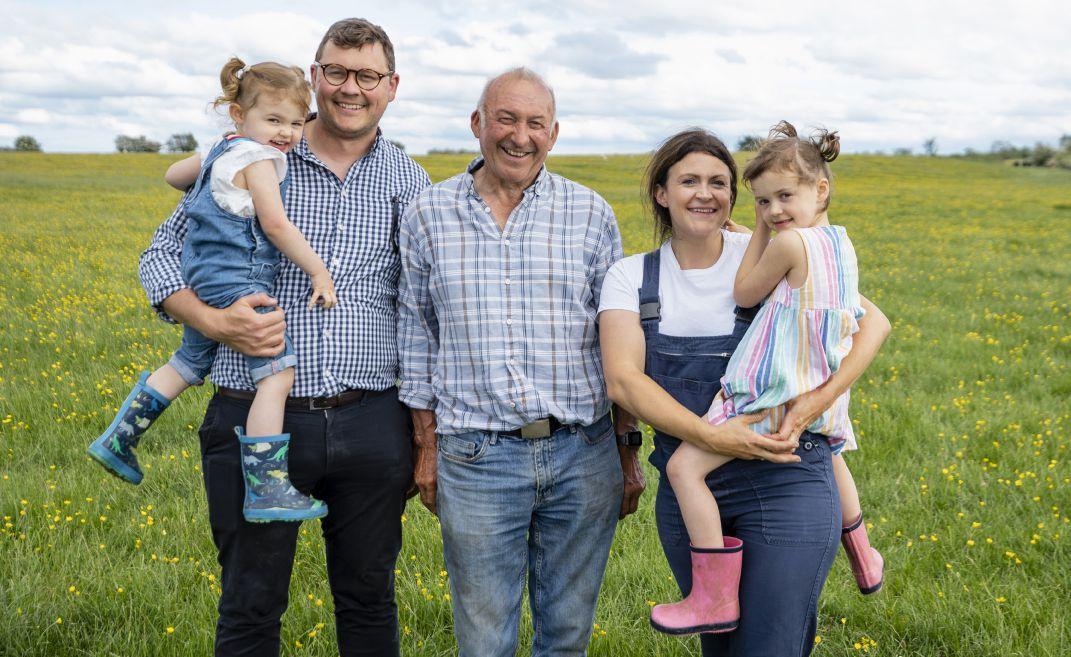
“They bring a unique perspective because they see both sides of the equation – as advisors and as farmers. It’s important to recognize and support that dual role.”
Although the “Focus on Farm Women” conferences have not been held since the COVID-19 pandemic, Robertson believes that future events could play a crucial role in supporting women in agriculture. She hopes that CAFA’s next executive director will continue to champion this cause.
Robertson’s journey with CAFA was not without its challenges. Taking on the role of Executive Director was a significant career risk, especially given the unique nature of the organization and the need to build it up from the ground.
“When I started with CAFA, everything was built up from next to nothing,” Robertson recalls. “It was a brand new learning curve, but it’s been fun. The biggest challenge was often working on my own, from a home office, and having to be both disciplined and creative to get the job done.”
Despite these challenges, Robertson’s leadership was instrumental in transforming CAFA into the thriving organization it is today. She built strong relationships with members and partners, navigated the organization through periods of change, and ensured that CAFA remained relevant and responsive to the needs of Canadian farm families.
One of Robertson’s proudest achievements was the success of the Farm Tax and Legal Update, which has grown into CAFA’s most important annual event. “It was almost like a make-or-break event for
CAFA,” she says. “But it turned out to be a big success, and now it’s our flagship event.”
As she looks to the future, Robertson hopes to see a continued focus on supporting family farms.
“There’s a lot of consolidation happening in agriculture right now, and I’d love to see the maintenance of smaller family farms,” Robertson says. “Family farms are so important because they keep communities going.”
Robertson also emphasized the importance of embracing new technologies and innovative practices in agriculture.
“There’s so much happening in agriculture,” she says. “It’s an industry that’s constantly evolving, and there’s always something new to learn.”
After more than 20 years of service, Robertson retired from her role as executive director of CAFA in June. As she steps down, she leaves behind an organization that is stronger, more diverse, and better equipped to serve the needs of Canadian farm families.
Reflecting on her career, Robertson expresses pride in what she has accomplished and offered some advice to her successor: “Stay connected with the members. They are the heart of CAFA, and their needs should always guide the organization’s direction. Also, don’t be afraid to innovate and try new things. Agriculture is changing, and CAFA needs to stay ahead of the curve to continue providing value to its members.” •
IWCA Honouree: Christine Brown
To listen to our podcast interview with Christine, visit agwomen.ca
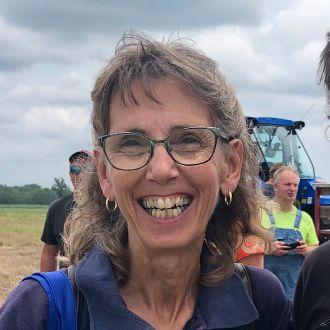
By Bree Rody
It didn’t take long to figure out that I wanted to be in agriculture,” says Christine Brown. The daughter of Dutch immigrants and dairy farmers, Brown and her three brothers contributed daily to farm operations. That’s how Brown, now a field crop specialist with the Ontario Ministry of Agriculture, Food and Agri-Food (OMAFA, formerly OMAFRA), still sees herself: as a contributor, and as someone always willing to lend a hand and be part of something bigger than her.
Brown always knew she would end up in agriculture – but, not thinking of herself as a scientist in her younger days, she first eyed a career in agricultural journalism. That nevertheless led her where most of Ontario’s aspiring ag professionals head: to the University of Guelph. She found herself in animal science and soil science courses. “I wanted to be involved in something that was going to make a difference. I didn’t want to be involved in widgets.”
From there, that led to seven years working with conservation authorities, and eventually, to what recently became known as OMAFA. Her time with conservation authorities, she says, was enjoyable because she was working up-close with farmers. “We got to work at the ground level, learning form observations and from trial and error, some of the practices that would work.”
When she eventually moved to OMAFA, management wanted the soil and crop specialists to each have a provincial specialty. “Because I was an animal science grad – animals produce manure, and so [my manager] said, ‘Chris, why don’t you do the manure specialty?’”
The rest, they say, is history.
While Brown’s specialty might be manure – she’s even known as @manuregirl on X (formerly Twitter) – the nature of her job lends itself to her working on a number of different projects with different goals, and different types of people. “I love the variety of activities that I get to be involved with, and that every day is so different,” says Brown.
A personal highlight for her is being on the original team that developed OMAFRA’s nutrient management software. “It started out as a program just for farmers, and then it became regulatory, and now it’s back to also having some components that are available for every farmer,” she explains. The organic amendment tool – also known as the manure calculator – is a particularly beloved pet project.
“I wanted to be involved in something that was going to make a difference. I didn’t want to be involved in widgets.”
She’s also twice served as a host of the North American Manure Expo. Big tentpole events, whether it’s ones she hosts, or ones where she gets to simply represent OMAFA, like Canada’s Outdoor Farm Show, allow her the thrill of being around like-minded people and exchanging knowledge with them.
But beyond the big, flashy achievements, Brown ultimately views herself as a steward of the land on which she is grateful to live. With her spirituality being of high personal importance, Brown says this influences her views on serving agriculture. “This is maybe a bit of a philosophy thing, but we as humanity are asked to be stewards of God’s creation, and to ensure that future generations are going to be able to have or produce food, to feed the world, to preserve the environment for everybody’s enjoyment.”
The farmers, researchers, businesspeople and agency folk with whom Brown gets to work make her feel like she’s working toward that goal. “I’m blessed to be involved in those things, and the variety of things that includes.” She says agriculture can sometimes be compartmentalized, and educating people about manure allows people to step back and view ag with a “big picture”perspective.
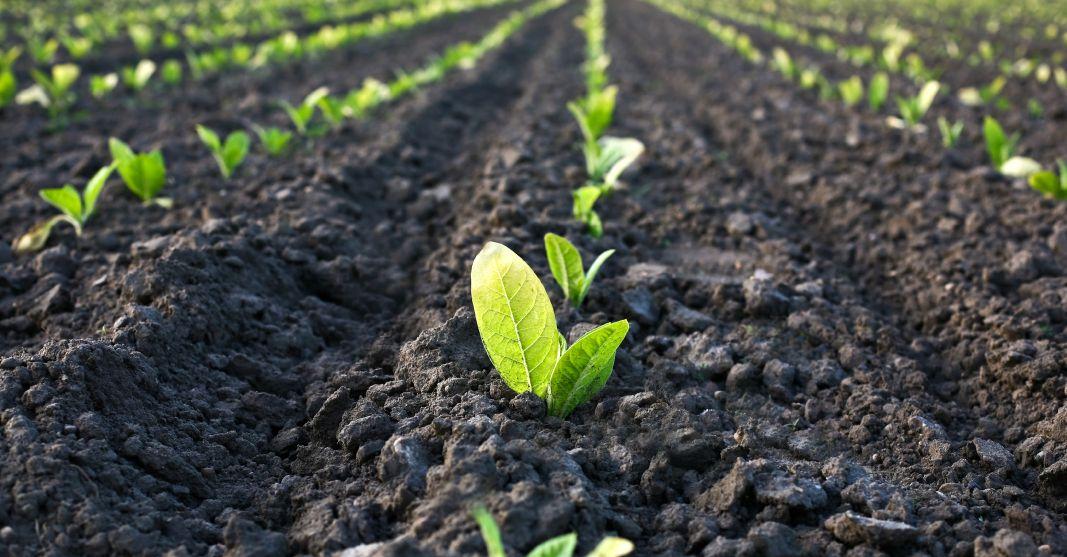
Another one of Brown’s sincere beliefs is in two old adages –that there’s no “I” in team, and that good things take a village. Her family, which includes five now-grown children, is of the utmost importance to her. That also means she’s had to work hard to find a balance between being effective at work and being there for her family.
“If I’m honest, I’d have to admit that balancing work and life is difficult,” she confesses. “My kids would say I work too much.” While her children used to joke about finding her job outrageous (“My kids, when they were growing up, they’d say, ‘Mommy, don’t tell anyone what you do!’” she jokes), her family has always been highly supportive and proud of her. Her husband and network close friends have been instrumental in helping with childcare, and a little flexibility at work has gone a long way. But ultimately, although balance has been tough to strike, Brown’s always been determined to not let her passion for work take away from her passion for family.
“There were a lot of nights where everything came out after the kids went to bed, and people don’t want to know what time I went to bed. If there was a sacrifice, it would have been sleep.”
“It’s amazing to be recognized by people from the States,” says Brown, acknowledging her three nominators – Glen Arnold, Robb Meinen and Kevin Erb, all fellow board members of the North American Manure Expo. “Getting to know some of my counterparts in other states, I’ve learned so much from them.”
Brown was first presented with the opportunity to bring the North American Manure Expo to Ontario in 2012. She’s been part of the Expo host team twice – once in 2013 and again in 2020.
Well, technically 2021. And even that didn’t go quite as planned. The then-worsening COVID-19 pandemic meant that a farm show gathering of hundreds of people simply could not happen. Even by
2021, while some restrictions on outdoor gatherings had loosened, they weren’t loose enough to allow for a farm show of hundreds of people, or to allow for U.S. exhibitors and attendees to cross the border.
But by then, the team had a plan. Virtual events were all the rage in the 2020-2021 stretch, and while some were pulled off better than others, the Ontario Expo crew found a way to deliver Expo content – including spreader demonstrations, tours and virtual “booths” – through live and pre-recorded video, including live Q&A and chat.
While Brown and her U.S. counterparts were happy to get back to in-person Expos the following year, she and her OMAFA colleagues were also inspired to capitalize on the appetite for online manure content.
“We’ve been able to keep some of that education content going through our Manure Mondays,” says Brown. “It’s a lot of work, but it’s also a lot of fun. We get participation from just as many people in the States as we do from Ontario, which to me is amazing and satisfying.”
Whether it’s creating software, hosting events or delivering education content to farmers and applicators across the continent, for Brown, the spirit of collaboration between like-minded people with like-minded goals is what fuels innovation.
“I feel that family of manure extension people who shares experiences and new ideas and messaging for the balance between manure economics and efficiency and environmental perspective… it raises the bar for manure management.” As for working in a field that can sometimes feel male-dominated, Brown lets her sincere love and passion for the agriculture do the talking and give her the confidence to stand tall. “I’ve learned that credibility and sincerity are more important with gender when you’re dealing with farmers,” she says. •
IWCA Honouree: Kimberley Cathline
To listen to our podcast interview with Kimberley, visit agwomen.ca
Following
her love of plants and curiosity has led Kimberley Cathline to a fulfilling career in applied agricultural research, in spite of the challenges.
By Alex Barnard
You’ve heard the saying: curiosity killed the cat, but satisfaction brought it back. Pursuing your curiosity isn’t always the easiest path, but that can make it all the more satisfying once it’s been sated. For Kimberley Cathline, associate director of the research program at the Horticultural & Environmental Sciences Innovation Centre (HESIC) at Niagara College, curiosity has long been a guiding force in her life.
“I’ve always had a curiosity about nature and the way things work. I can recall this going back to my youth – I’ve always asked why,” she says. “And I really love plants. They bring me joy; I love how they’re so versatile.”
Combining these two interests led Cathline to pursue an education focused on plant biology and a career in applied agricultural research –one which was not necessarily her intention when she began.
Yet, during her 19-year career, Cathline has worked at several foremost institutions in Ontario agriculture, and especially horticulture: the University of Guelph, the National Research Council of Canada, the University of California, Davis, Vineland Research and Innovation Center, and now with Niagara College’s HESIC. Through her applied research, she’s contributed to the agriculture industries in both Canada and the United States.
But the road hasn’t always been smooth or easy.
In 2005, just after completing her bachelor’s degree, Cathline drove across Canada and the United States to take a job at the University of California in Fresno. She interviewed for the position over the phone and had never been to California before.
“I didn’t know anybody,” she says. “I had no idea if I would enjoy doing viticulture research. I knew nothing about Fresno. And I’m dating myself a little bit, but at the time the internet barely existed, so I couldn’t just Google and research everything, which I tend to like to do. I had to go into a lot of unknowns.” The risk paid off, though, as this is the position that launched Cathline’s career in agricultural research. During the five years she was in California, Cathline also met and married her husband, and their daughter was also born there.
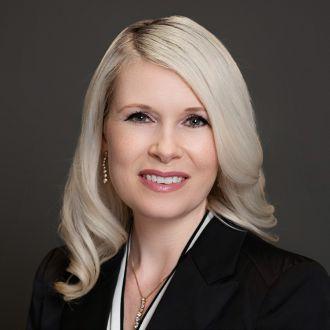
Shortly after returning to Ontario with her family, Cathline embarked on her biggest accomplishment and challenge. They’re the same thing: completing her master’s degree. When she started her master’s in biological sciences at Brock University, Cathline was a mature student, working a full-time job and raising her then-two-year-old daughter.
“It was incredibly difficult,” she says. “It meant juggling the responsibilities of being a mother, a student, a professional. It also meant I had to say no to things in different areas of my life in order to make room for pursuing a graduate degree.”
“One piece of advice I always try to remember is to be present in the moment.”
Cathline completed her degree in three and a half years while balancing her many competing priorities – and in spite of some less than helpful advice.
“Many people along the way told me I should give up. They were like, ‘This is too hard. You should just quit,’” she says. “Which was not what I was looking for – I was looking for encouragement!”
Cathline can laugh about it now, but hearing that repeatedly added to the challenge she was already undertaking.
“I also had individuals that actually, specifically and intentionally put roadblocks in my way to completing that degree,” she says.
In the face of this push-back, Cathline had to consciously choose to overcome these obstacles in order to move forward.
“So, when I finally walked across that stage and received my degree, it was such a defining moment for me,” she says.
Cathline adds that it was extra special because her young daughter was in the audience, watching her mother accomplish something she’d worked so hard to achieve.
Despite the difficulties she faced, the benefits outweigh the negatives
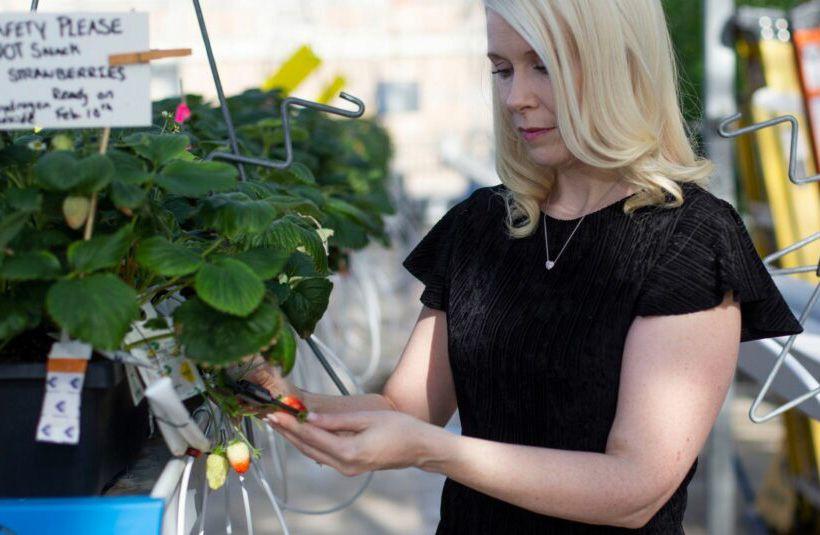
for Cathline.
“I think, overall, it was a good experience,” she says. “I learned I can do hard things – that was something I really learned from the experience.
“I learned the incredible importance of my family and my faith as support systems in my life. I also learned the value of taking time to just reflect and celebrate the moments in life.”
Taking time to reflect is putting into practice a piece of advice Cathline received and that she strives to keep in mind.
“One piece of advice I always try to remember is to be present in the moment. Each moment is such a gift, and often we’re thinking about the future and how we’re going to achieve that next goal, or we’re dwelling on our past and how we could have done things better,” Cathline says.
“But all we have is right now. And someone once told me to take mental photographs of the moments in your life, because it just flies by. If you aren’t intentional about embracing the moments, then you’ll miss them.”
When it comes to advice she would give herself if she were back at the start of her career, Cathline says, “I would tell myself to be confident – be confident in yourself; be confident in your abilities. Learn everything that you can from the leaders around you.”
She also talks about the importance of finding out what you’re good at – and what your team members are good at. Working to build on
those strengths will make the entire team better.
For those considering a career in agriculture, Cathline suggests looking into a research role.
“There are a lot of really bright minds who could contribute to advancing the agriculture industry, but by looking at it through a different perspective,” she says.
“I’d also really encourage them to consider the many areas of horticulture, because I think a career in horticulture is a really rewarding experience. You’re impacting real people, real lives. You’re bringing beauty, joy, health and satisfaction to the world through horticulture.”
For Cathline, this direct impact she can have on the lives of others through her work is one of the things that keeps her excited to be part of this industry.
“Working in agriculture and in research, I can see tangible outcomes, and I can see it touching and enriching people’s lives.”
As for what the future holds, Cathline thinks artificial intelligence (AI) has an important role to play.
“There’s a big focus on AI right now and it’s developing quickly. I’ve had a lot of recent conversations about how we can further leverage AI for the agriculture industry, and how it could maybe help with food insecurity or food transportation logistics,” she says.
“I think there also may be a role for AI in contributing to the reduction of food waste. I think that’s an area where we’re going to see changes and improvements in the coming years.” •
If you’re a woman in the agriculture industry, we have the financing and resources to help move your business forward.
Learn more at fcc.ca/WomenEntrepreneurs

DREAM. GROW. THRIVE.